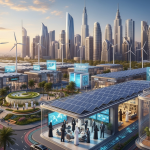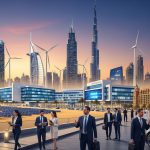Introduction
The United Arab Emirates (UAE) continues to solidify its position as a leading hub for foreign direct investment (FDI) in the Middle East. Recent data indicates a notable surge in FDI inflows, driven by the country’s strategic economic diversification efforts and favorable business environment. This article explores the latest trends in FDI, the sectors attracting investment, and the implications for businesses looking to establish or expand their operations in the UAE.
Current State of Foreign Direct Investment in the UAE
According to the latest reports from the UAE Ministry of Economy, FDI inflows reached an impressive AED 73 billion in 2022, marking a 10% increase compared to the previous year. This growth reflects the UAE’s commitment to creating a competitive and attractive investment landscape. The government has implemented various initiatives to enhance the ease of doing business, including the introduction of 100% foreign ownership in certain sectors and the establishment of free zones.
Key Sectors Attracting Investment
Several sectors are emerging as focal points for foreign investors, highlighting the UAE’s diverse economic landscape:
– **Technology and Innovation**: The UAE is rapidly becoming a tech hub, with significant investments in fintech, artificial intelligence, and blockchain technologies. The government’s support for startups and innovation through initiatives like the Dubai Future Foundation has attracted numerous tech companies.
– **Renewable Energy**: As part of its commitment to sustainability, the UAE is investing heavily in renewable energy projects. The Mohammed bin Rashid Al Maktoum Solar Park is one of the largest solar projects globally, attracting both local and international investors.
– **Healthcare**: The COVID-19 pandemic has accelerated investments in the healthcare sector, with a focus on biotechnology, pharmaceuticals, and telemedicine. The UAE’s advanced healthcare infrastructure and regulatory framework make it an attractive destination for healthcare investments.
– **Tourism and Hospitality**: With the UAE’s strategic location and world-class infrastructure, the tourism sector continues to thrive. Major events, such as Expo 2020 Dubai, have further boosted investments in hotels, entertainment, and leisure facilities.
Government Initiatives Supporting FDI
The UAE government has introduced several initiatives to enhance its FDI attractiveness:
1. **Economic Free Zones**: The establishment of free zones allows foreign investors to enjoy tax exemptions, full ownership, and streamlined regulatory processes. Notable free zones include the Dubai Multi Commodities Centre (DMCC) and Abu Dhabi Global Market (ADGM).
2. **100% Foreign Ownership**: The recent policy changes permitting 100% foreign ownership in various sectors have significantly increased investor confidence. This move is particularly beneficial for industries such as manufacturing and e-commerce.
3. **Investment Promotion Agencies**: Organizations like the UAE Federation of Chambers of Commerce and Industry and the Abu Dhabi Investment Authority play a crucial role in promoting investment opportunities and facilitating connections between investors and local businesses.
4. **Legal Framework Enhancements**: The UAE has made strides in improving its legal framework to protect investors’ rights and ensure transparency. The introduction of the Foreign Investment Law has provided a clear structure for foreign entities looking to invest in the UAE.
Challenges and Considerations for Foreign Investors
While the UAE presents numerous opportunities, foreign investors should be aware of certain challenges:
– **Cultural Differences**: Understanding local customs and business practices is essential for successful operations in the UAE. Building relationships and trust with local partners can significantly influence business outcomes.
– **Regulatory Compliance**: Navigating the regulatory landscape can be complex, especially for new entrants. Investors should seek local legal and business consultancy services to ensure compliance with local laws.
– **Market Competition**: The UAE’s attractiveness has led to increased competition across various sectors. Investors must conduct thorough market research and develop unique value propositions to stand out.
Future Outlook for FDI in the UAE
The future of FDI in the UAE looks promising, with several factors contributing to this positive outlook:
– **Continued Economic Diversification**: The UAE’s commitment to diversifying its economy beyond oil will continue to attract foreign investments in emerging sectors.
– **Expo 2020 Legacy**: The legacy of Expo 2020 Dubai is expected to drive further investments in tourism, infrastructure, and innovation.
– **Global Economic Recovery**: As the global economy recovers from the pandemic, the UAE is well-positioned to attract international investors seeking new opportunities.
Conclusion
The UAE’s proactive approach to attracting foreign direct investment is yielding significant results, positioning the country as a top destination for global investors. By focusing on key sectors, enhancing regulatory frameworks, and promoting a business-friendly environment, the UAE is set to continue its trajectory of growth and innovation. For businesses looking to enter the UAE market, understanding these trends and leveraging the available resources will be crucial for success. For more insights on investment opportunities and business setup in the UAE, visit Persian Horizon.
Source: https://www.emirates247.com/business








